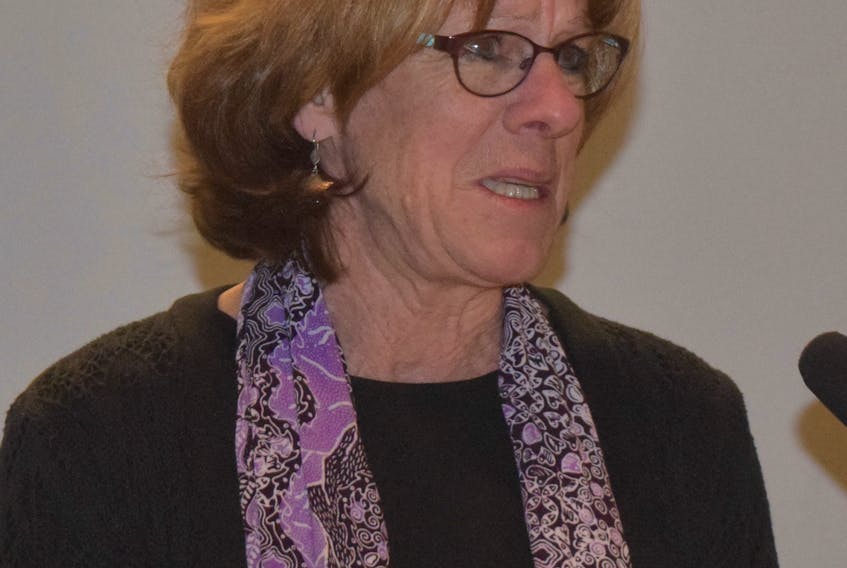The author of a new book is confident there will be “an awakening” relating to the Northern Pulp mill and hopes those who share her cause can “clean this mess up” – quoting Pictou Landing First Nation Chief Andrea Paul.
Joan Baxter spoke to a full auditorium of supporters, at the official launch of her book at the Museum of Industry. “The Mill: Fifty Years of Pulp and Protest” documents the political resistance of activists who object to the mill, asserting that the Nova Scotia government is beholden to private interests, and that the mill is a threat to local ecosystems and wildlife in and around the Northumberland Strait.
If there was anyone who didn’t agree with Baxter and her position, they did not speak up that night. The Tuesday evening event had an air of utter solidarity, with singer and activist Dave Gunning, a member of the Clean the Mill Group, opening with music that was a propos to the theme of the book.
Baxter admitted she was surprised that nobody spoke out against her writing and assertions, saying, “I was talking to a friendly audience and I was a little surprised that I didn’t hear any differing opinions.
“I understand that this can be a sensitive topic – livelihoods depend on the mill. I would have been happy to engage people, if they read the book.”
Baxter gave accolades to those who helped her gather the information she used to write The Mill for their determination and courage – these include members of the Clean the Mill Group, the Pictou County Fishermen’s Association and the people of Pictou Landing First Nation.
A major theme in Baxter’s book is discontent and criticism of a government she sees as complicit, lacking in accountability, and “held hostage” by corporate interests.
Baxter recalled feeling a great deal of shock as she researched the topic, adding that the corporations that have owned the mill “have taken the government hostage.”
“One government after another, no matter what party, once they got into power,” became supportive of the mill, Baxter asserted, “even if they’d been real critics of it before. They’re so afraid of losing those jobs.”
“People have been protesting this forever, and that a lot of you have been part of that,” said Baxter, who added she doesn’t blame the politicians under the Robert Stanfield provincial government in the 1960s, because “they didn’t know any better. They had no idea what they were in for.”
Baxter spoke to guests about research for the book – and how she collaborated with Gunning and other people of a similar stance on the mill, such as the people of Pictou Landing First Nation – in the hopes of writing an article about the issues she and others have.
Baxter said that with 27 pages of notes, from an initial conversation with Gunning, “and I don’t know how many gigabytes of files… I thought, ‘Wow, this is more than an article. This is a book. So that’s how it started, and it never stopped.”
Speaking to guests, Baxter referred to high cancer and respiratory disease rates in the area, and stated how studies requested by groups like the Pictou Watershed Coalition have been overlooked and denied by the government.
Baxter’s writing thoroughly referenced the lives of people at Pictou Landing First Nation – at the launch she read a passage describing the experience of residents of the reservation, before, during and after the construction and commencement of operation of the pulp mill.
Baxter noted that The Mill also criticizes forestry practices related to the manufacture of pulp at the mill, referencing the potential ecological damage of planting and clear-cutting practices currently in place.
Pictou Landing First Nation Chief Andrea Paul voiced her ardent approval of Baxter’s work, giving guests an account of the struggles of the First Nation to get the message out, and of the harm they have experienced and attribute to the pulp mill.









